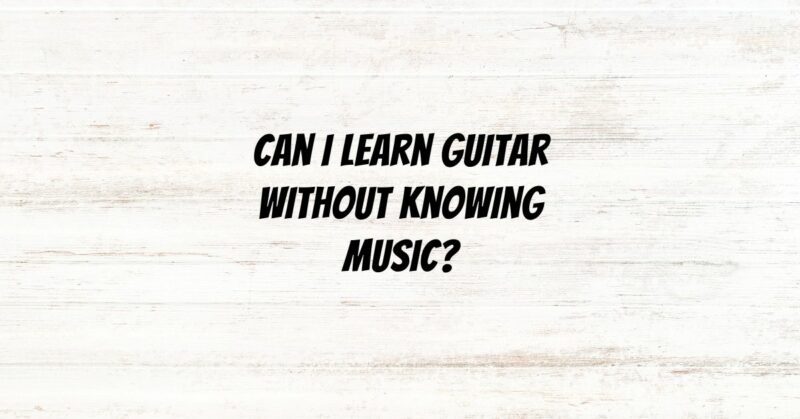The prospect of learning guitar without any prior knowledge of music theory or notation is a common concern among aspiring guitarists. Many beginners wonder if it’s possible to pick up this beloved instrument without delving into the complexities of musical theory. In this article, we’ll explore the feasibility of learning guitar without a deep understanding of music and offer guidance on how to navigate this musical journey.
The Advantages of Learning Guitar Without Music Theory:
1. Immediate Hands-On Experience:
- One of the advantages of starting guitar without a strong music theory background is that you can begin playing and making music right away. Learning a few chords allows you to strum along to your favorite songs, providing a sense of accomplishment early on.
2. Emphasis on Practical Skills:
- By focusing on practical skills, such as chord progressions, strumming patterns, and basic fingerpicking, you can enjoy playing songs you love without the need for extensive music theory knowledge.
3. Reliance on Tablature and Visual Learning:
- Many guitarists use tablature (tabs) as a visual way to learn songs. Tabs provide a straightforward way to understand where to place your fingers on the fretboard and which strings to play without requiring traditional music notation skills.
4. Informal Learning:
- Informal learning through online tutorials, video lessons, or learning by ear allows you to acquire skills gradually without the formal structure of music theory lessons.
Considerations for Learning Guitar Without Music Theory:
1. Limited Understanding of Music Structure:
- Without music theory knowledge, you may have a limited understanding of the structure of songs, scales, and chord progressions. This can hinder your ability to create music independently.
2. Difficulty with Advanced Techniques:
- Advanced guitar techniques, such as improvisation, complex fingerpicking patterns, or understanding modal theory, may be more challenging to grasp without some knowledge of music theory.
3. Limited Communication with Other Musicians:
- If you plan to collaborate with other musicians or join a band, a basic understanding of music theory can facilitate communication and enhance your ability to contribute creatively.
4. Stagnation in Skill Development:
- Depending solely on chord diagrams and tabs may lead to skill stagnation. To become a well-rounded guitarist, you may eventually need to explore music theory concepts to expand your horizons.
Is It Possible to Learn Guitar Without Music Theory?
Yes, it is entirely possible to learn guitar without a deep understanding of music theory. Many guitarists start this way and achieve proficiency by focusing on practical skills, such as chords, rhythm, and song learning. The guitar’s visual nature and the abundance of online resources make it accessible to beginners without extensive music theory knowledge.
To make the most of your guitar learning journey without music theory, consider the following tips:
- Start with Simple Chords: Begin with basic open chords like C, G, D, and A. These chords will allow you to play a wide variety of songs.
- Use Tablature: Familiarize yourself with guitar tablature (tabs) as a visual guide to playing songs. Tabs provide fretboard diagrams that indicate where to place your fingers.
- Learn Songs You Love: Choose songs you’re passionate about to stay motivated. Learning to play your favorite songs is an enjoyable way to progress.
- Explore Online Resources: Utilize online tutorials, video lessons, and interactive apps that cater to beginners and focus on practical guitar skills.
- Consider Music Theory Later: As you become more comfortable with the guitar, you can gradually delve into music theory concepts when you feel ready to expand your musical horizons.
In conclusion, learning guitar without a deep understanding of music theory is not only possible but also a common approach for many beginners. The guitar offers a welcoming entry point to the world of music, allowing you to enjoy playing and creating melodies without being burdened by complex theoretical knowledge. As you progress, you can decide if and when you want to explore music theory further to enhance your musical journey.


